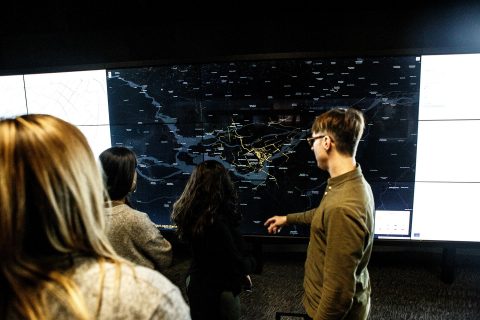Instructional Technology (GrDip)
Program overview
The Graduate Diploma in Instructional Technology prepares you for careers in developing instructional and informational materials, and in assisting with technology projects in training and communication departments, higher education institutions, schools, and nonprofits. In the program, you explore how to design and develop instructional and informational materials as well as broader campaigns that link these together to improve the performance of individuals and organizations. Preparation in learning theories ensures that instructional and communication strategies used address human learning and cognition. Courses in using production tools, communication skills, consulting, designing games, and administration prepare you for real-world challenges. An optional Field Experience (internship) with one of our wide network of corporate, government, and community partners guides you in applying the skills learned through the program and launching the next phase of your career.
Program structure
Degree Requirements
Fully-qualified candidates are required to complete a minimum of 30 credits.
Please see the Education Courses page for course descriptions.
Instructional Technology Graduate Diploma (30 credits)
| Note: Research papers, essays, examinations or preparation of audio-visual materials may be required as part of the work for individual courses. | |
| 9 | credits of Required Courses: |
| 3 | additional credits of Required Courses chosen from: |
| 18 | credits of Elective Courses: |
Admission requirements
Admission Requirements
- Bachelor's degree with at least a major or the equivalent in any subject.
- Proficiency in English. Applicants whose primary language is not English must demonstrate that their knowledge of English is sufficient to pursue graduate studies in their chosen field. Please refer to the English language proficiency page for further information on requirements and exemptions.
Application process
Application deadlines

FALL
December 1 (all applicants)

WINTER
n/a

SUMMER
n/a
Priority will be given to complete applications submitted by the deadline. In some cases, programs may continue to accept applications as long as there is space available.
International students: Considering the waiting period involved in meeting the entry requirements to Canada and Quebec, we strongly encourage international applicants to apply early and submit supporting documents prior to the deadline.
Tuition & funding
Tuition and fees
Tuition and fees of the program may depend on your student status, among other key factors. Estimate these costs based on the most common situations.
Awards and funding
Funding packages are generally available for students in thesis-based programs. Course-based students may be eligible for a number of donor awards, and may consult with their department for program-specific opportunities.
Out-of-province students
Get $2,000 in special funding for graduate diploma programs. Learn more
Other programs of interest

Identify educational problems and apply developments in psychology, information/communication and technology, management and systems analysis to solve them in your consultancy as an education technology professional.
Department
Faculty


